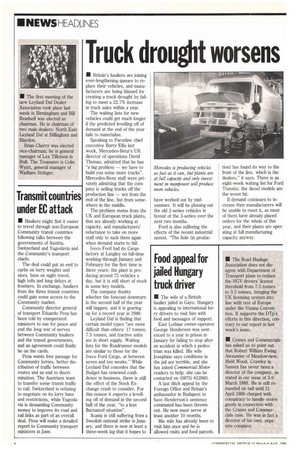Truck drought worsens
Page 8

If you've noticed an error in this article please click here to report it so we can fix it.
• Britain's hauliers are joining ever-lengthening queues to replace their vehicles, and manufacturers are being blamed for creating a truck drought by failing to meet a 22.7% increase in truck sales within a year.
The waiting lists for new vehicles could get much longer if the predicted levelling off of demand at the end of the year fails to materialise.
Speaking to Parceline chief executive Barry Ellis last week, Mercedes-Benz's UK director of operations David Thomas, admitted that he has "a big problem — we have to build you some more trucks". Mercedes-Benz staff were privately admitting that the company is selling trucks off the production line — not from the end of the line, but from somewhere in the middle.
The problem stems from the UK and European truck plants, that are already working at capacity, and manufacturers' reluctance to take on more staff only to sack them again when demand starts to fall.
Iveco Ford had its Cargo factory at Langley on full-time working through January and February for the first time in three years: the plant is producing around 72 vehicles a day, but it is still short of stock in some key models.
The company doubts whether the forecast downturn in the second half of the year will happen, and it is gearing up for a record year in 1988.
Leyland Daf is finding that certain model types "are more difficult than others: 17 tonnes, 7.5 tonnes, and tractive units are in short supply. Waiting lists for the Roadrunner models are similar to those for the Iveco Ford Cargo, at between seven and ten weeks." While Leyland Daf concedes that the Budget has renewed confidence in business, there is still the effect of the Stock Exchange crash to consider. For this reason it expects a levelling off of demand in the second half of the year, "to a less fluctuated situation".
Sc,ania is still suffering from a Swedish national strike in January, and there is now at least a three-week lag that it hopes to Mercedes is producing vehicles as fast as it can, but plants are at full capacity and only investment in manpower will produce more vehicles.
have worked out by midsummer. It will be phasing out the old 2-series vehicles in favour of the 3-series over the next two months.
Ford is also suffering the effects of the recent industrial unrest. "The hole (in produc tion) has found its way to the front of the line, which is the dealers," it says. There is an eight-week waiting list for Ford Transits; the diesel models are the worst hit.
If demand continues to increase then manufacturers will be unable to meet it, as most of them have already placed orders for the whole of this year, and their plants are operating at full manufacturing capacity anyway.
















































































































































